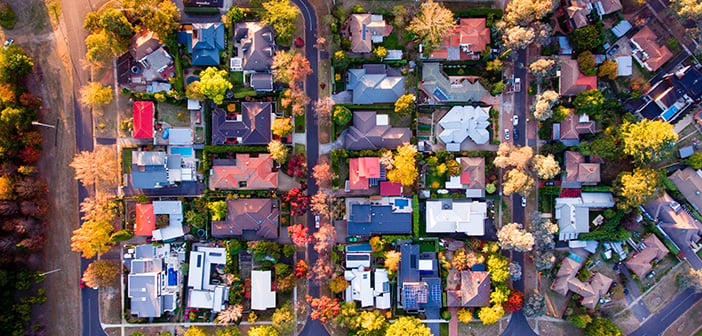U.S. Homeowners Four Times as Likely to Be Equity Rich Than Underwater

A new study based on mortgage and deed of trust data by ATTOM Data Solutions has found that American homeowners are far more likely to be equity rich than seriously underwater in their mortgage. An equity-rich home was defined as one in which "the combined estimated amount of loans secured by those properties was 50% or less of their estimated market value." On the other hand, seriously underwater properties were those "with a combined estimated balance of loans secured by the property at least 25% more than the property’s estimated market value." Equity-rich properties included 14.5 million residential properties in the United States, which "represented 26.5%, or about one in four, of the 54.7 million mortgaged homes." The report also notes that "3.6 million, or one in 15, mortgaged homes" were seriously underwater. This was, however, for the first quarter of 2020, before the coronavirus pandemic and subsequent lockdowns were put in place. What effect that will have on the real estate market is, at this time, uncertain. But the most educated predictions are not encouraging. The report even notes that the percentage of equity-rich homes in Q1 (26.5%) was "down slightly from the 26.7% level in the fourth quarter of 2019." This is further evidence the United States was already on the eve of a recession before the coronavirus hit as many (including myself) had predicted. Indeed, while one in 15 homes being seriously underwater may not sound like a lot, it's actually distressing that there are any such homes left after we had just lived through the longest-ever economic expansion in American history (126 months). _ Related: 8 Ways to Identify the Best Places to Buy Rental Property_
Equity Rich vs. Underwater Property by Region
The regional results tended to be the opposite of ATTOM Data Solutions' previous report on which areas were more affordable to buy and which were more affordable to rent. This isn't particularly surprising as the more affluent markets will have more homeowners who drive up the price of housing and make it less affordable to purchase by competing with each other to buy properties. Then, as housing prices in those areas increase, people who already own properties will see the amount of equity in their homes increase substantially above their already-existing mortgage. Regarding this study, the areas that were most likely to have equity-rich properties tended to be more affluent, and those states with the least were more economically distressed. As the report notes,
"The top 10 states with the highest share of equity-rich properties in the first quarter of 2020 were all in the Northeast and West regions, led by California (42.3% equity-rich), Hawaii (39.0%), Vermont (38.2%), Washington (36.6%), and Oregon (34.0%)."States with the lowest percentage of equity-rich properties were Louisiana (13.5% equity rich), Oklahoma (14.7%), Illinois (15.2%), Arkansas (16.3%), and Alabama (16.3%). Those were the same states with the five lowest levels in the fourth quarter of 2019."
It was a similar story for the county data with the most equity-rich counties tending to be in affluent Northeast and Western states and the lowest percent of equity-rich houses concentrated in the Southeast. For example, San Mateo County in California had the highest percentage of equity-rich homes in the country at 72.3%. Not surprisingly, the states with the most seriously underwater properties were also mostly in the South, Midwest, and Rust Belt areas.
"The top 10 states with the highest shares of mortgages that were seriously underwater in the first quarter of 2020 were all in the South and Midwest regions, led by Louisiana (17.3% seriously underwater), Mississippi (16.9%), West Virginia (15.7%), Iowa (14.2%), and Arkansas (13.0%)."
Youngstown, Ohio, had the highest percentage of seriously underwater properties of any city at 17.0%. _ Related: 2020 BPInsights Market Study: Top 25 U.S. Cities for Cash Flow & Appreciation_ 
Key Takeaways for Real Estate Investors
So many things are, of course, in flux with all of the economic uncertainty due to the coronavirus. That being said, this study does have a few key takeaways for real estate investors.
- The small decrease in the percentage of homes that are equity rich prior to the coronavirus pandemic and the substantial number of houses that were still seriously underwater provide further evidence the U.S. was already heading toward a recession. Thus, COVID-19 will only exacerbate the economic turmoil. So, it would be wise to expect a fairly serious recession and not a "V-shaped" recovery.
- There are still a large number of houses that are equity rich out there—14.5 million to be exact.
Equity-rich houses provide the best opportunities for real estate investors as the owner can actually afford to sell at a discount without doing a short sale or bringing money to the table. A good number of these houses need repairs the owner does not want to do, are located in a state far away so the owner does not want to manage it, or are properties the owner just plain doesn't want to deal with at all. Equity-rich houses with owners who don't want them are great opportunities for real estate investors. Thus, this report highlights that there are still opportunities out there. In a market like this, however, it's important to be extra careful. You don't want to try to catch a falling knife. Real estate values are likely to decline in the near future. So, make sure to discount your offers at least an extra 5-10% to compensate, and don't go out on any limbs or take any big chances. A recession doesn't mean you should stop buying, but it sure does mean you should be much more careful and conservative when you do buy. You can see the entire ATTOM Data Solutions study here. Questions? Comments? Share below!
Questions? Comments? Share below!
